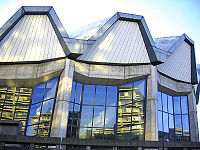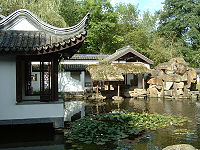
Ruhr University
Encyclopedia


Ruhr Area
The Ruhr, by German-speaking geographers and historians more accurately called Ruhr district or Ruhr region , is an urban area in North Rhine-Westphalia, Germany. With 4435 km² and a population of some 5.2 million , it is the largest urban agglomeration in Germany...
Bochum
Bochum
Bochum is a city in North Rhine-Westphalia, western Germany. It is located in the Ruhr area and is surrounded by the cities of Essen, Gelsenkirchen, Herne, Castrop-Rauxel, Dortmund, Witten and Hattingen.-History:...
, was founded in 1962 as the first new public university
University
A university is an institution of higher education and research, which grants academic degrees in a variety of subjects. A university is an organisation that provides both undergraduate education and postgraduate education...
in Germany since World War II
World War II
World War II, or the Second World War , was a global conflict lasting from 1939 to 1945, involving most of the world's nations—including all of the great powers—eventually forming two opposing military alliances: the Allies and the Axis...
. Instruction began in 1965.
The Ruhr-University Bochum is one of the largest universities in Germany and part of the Deutsche Forschungsgemeinschaft
Deutsche Forschungsgemeinschaft
The Deutsche Forschungsgemeinschaft is an important German research funding organization and the largest such organization in Europe.-Function:...
, the most important German research funding organization.
The RUB has been very successful in the Excellence Initiative by the German Federal and State Governments (2007), a competition among Germany's most prestigious universities. It was one of the few institutions left competing for the title of an "elite university", but did not succeed in the last round of the competition. There are currently nine universities in Germany that hold this title.
The University of Bochum was one of the first universities in Germany to introduce international Bachelor and Master degrees, which replaced the traditional German Diplom and Magister. Except for a few special cases (for example in Law) this process has been completed and all degrees been converted. Today, the university offers a total of 150 different study programs from all fields.
Ruhr University is financed and administered by the state of North Rhine-Westphalia
North Rhine-Westphalia
North Rhine-Westphalia is the most populous state of Germany, with four of the country's ten largest cities. The state was formed in 1946 as a merger of the northern Rhineland and Westphalia, both formerly part of Prussia. Its capital is Düsseldorf. The state is currently run by a coalition of the...
. Currently, 34,024 students (2010) are enrolled, and the university employs over 5,000 staff (432 of which are professors), making it one of the ten largest universities in Germany (as of 2003). Kurt Biedenkopf
Kurt Biedenkopf
Kurt Hans Biedenkopf is a German politician. He was Ministerpräsident of the Free State of Saxony from 1990 until 2002, as such serving as President of the Bundesrat in 1999/2000.- Biography :...
, who later became prime minister of the state of Saxony
Saxony
The Free State of Saxony is a landlocked state of Germany, contingent with Brandenburg, Saxony Anhalt, Thuringia, Bavaria, the Czech Republic and Poland. It is the tenth-largest German state in area, with of Germany's sixteen states....
, was director of the university from 1967 to 1969.
Unlike a number of traditional universities, the buildings of Ruhr University are all centralized on one campus, except for the Faculty of Medicine, which also includes some hospitals in Bochum and the Ruhr area. Although the university is notorious for its monotonous sixties architecture, mainly consisting of 14 almost identical high-rise buildings, its location at the edge of a green belt on top of the Ruhr valley is rather scenic.
Organization
The university is organized in twenty different faculties. These are:- Faculty of Protestant TheologyTheologyTheology is the systematic and rational study of religion and its influences and of the nature of religious truths, or the learned profession acquired by completing specialized training in religious studies, usually at a university or school of divinity or seminary.-Definition:Augustine of Hippo...
- Faculty of CatholicCatholicThe word catholic comes from the Greek phrase , meaning "on the whole," "according to the whole" or "in general", and is a combination of the Greek words meaning "about" and meaning "whole"...
TheologyTheologyTheology is the systematic and rational study of religion and its influences and of the nature of religious truths, or the learned profession acquired by completing specialized training in religious studies, usually at a university or school of divinity or seminary.-Definition:Augustine of Hippo... - Faculty of PhilosophyPhilosophyPhilosophy is the study of general and fundamental problems, such as those connected with existence, knowledge, values, reason, mind, and language. Philosophy is distinguished from other ways of addressing such problems by its critical, generally systematic approach and its reliance on rational...
, EducationEducationEducation in its broadest, general sense is the means through which the aims and habits of a group of people lives on from one generation to the next. Generally, it occurs through any experience that has a formative effect on the way one thinks, feels, or acts...
and JournalismJournalismJournalism is the practice of investigation and reporting of events, issues and trends to a broad audience in a timely fashion. Though there are many variations of journalism, the ideal is to inform the intended audience. Along with covering organizations and institutions such as government and... - Faculty of HistoryHistoryHistory is the discovery, collection, organization, and presentation of information about past events. History can also mean the period of time after writing was invented. Scholars who write about history are called historians...
- Faculty of PhilologyPhilologyPhilology is the study of language in written historical sources; it is a combination of literary studies, history and linguistics.Classical philology is the philology of Greek and Classical Latin...
- Faculty of LawLawLaw is a system of rules and guidelines which are enforced through social institutions to govern behavior, wherever possible. It shapes politics, economics and society in numerous ways and serves as a social mediator of relations between people. Contract law regulates everything from buying a bus...
- Faculty of EconomicsEconomicsEconomics is the social science that analyzes the production, distribution, and consumption of goods and services. The term economics comes from the Ancient Greek from + , hence "rules of the house"...
- Faculty of Social Science
- Faculty of East Asian StudiesEast Asian studiesEast Asian Studies is a distinct multidisciplinary field of scholarly enquiry and education that promotes a broad humanistic understanding of East Asia past and present...
- Faculty of Sports ScienceSports scienceSport science is a discipline that studies the application of scientific principles and techniques with the aim of improving sporting performance...
- Faculty of PsychologyPsychologyPsychology is the study of the mind and behavior. Its immediate goal is to understand individuals and groups by both establishing general principles and researching specific cases. For many, the ultimate goal of psychology is to benefit society...
- Faculty of CivilCivil engineeringCivil engineering is a professional engineering discipline that deals with the design, construction, and maintenance of the physical and naturally built environment, including works like roads, bridges, canals, dams, and buildings...
and Environmental EngineeringEnvironmental engineeringEnvironmental engineering is the application of science and engineering principles to improve the natural environment , to provide healthy water, air, and land for human habitation and for other organisms, and to remediate polluted sites... - Faculty of Mechanical EngineeringMechanical engineeringMechanical engineering is a discipline of engineering that applies the principles of physics and materials science for analysis, design, manufacturing, and maintenance of mechanical systems. It is the branch of engineering that involves the production and usage of heat and mechanical power for the...
- Faculty of Electrical EngineeringElectrical engineeringElectrical engineering is a field of engineering that generally deals with the study and application of electricity, electronics and electromagnetism. The field first became an identifiable occupation in the late nineteenth century after commercialization of the electric telegraph and electrical...
and Information TechnologyInformation technologyInformation technology is the acquisition, processing, storage and dissemination of vocal, pictorial, textual and numerical information by a microelectronics-based combination of computing and telecommunications... - Faculty of MathematicsMathematicsMathematics is the study of quantity, space, structure, and change. Mathematicians seek out patterns and formulate new conjectures. Mathematicians resolve the truth or falsity of conjectures by mathematical proofs, which are arguments sufficient to convince other mathematicians of their validity...
- Faculty of PhysicsPhysicsPhysics is a natural science that involves the study of matter and its motion through spacetime, along with related concepts such as energy and force. More broadly, it is the general analysis of nature, conducted in order to understand how the universe behaves.Physics is one of the oldest academic...
and AstronomyAstronomyAstronomy is a natural science that deals with the study of celestial objects and phenomena that originate outside the atmosphere of Earth... - Faculty of Geosciences
- Faculty of ChemistryChemistryChemistry is the science of matter, especially its chemical reactions, but also its composition, structure and properties. Chemistry is concerned with atoms and their interactions with other atoms, and particularly with the properties of chemical bonds....
and BiochemistryBiochemistryBiochemistry, sometimes called biological chemistry, is the study of chemical processes in living organisms, including, but not limited to, living matter. Biochemistry governs all living organisms and living processes... - Faculty of BiologyBiologyBiology is a natural science concerned with the study of life and living organisms, including their structure, function, growth, origin, evolution, distribution, and taxonomy. Biology is a vast subject containing many subdivisions, topics, and disciplines...
and BiotechnologyBiotechnologyBiotechnology is a field of applied biology that involves the use of living organisms and bioprocesses in engineering, technology, medicine and other fields requiring bioproducts. Biotechnology also utilizes these products for manufacturing purpose... - Faculty of MedicineMedicineMedicine is the science and art of healing. It encompasses a variety of health care practices evolved to maintain and restore health by the prevention and treatment of illness....
English education
ECUE - European Culture and Economy
Interdisciplinary institutions
- Interdisciplinary Centre for Advanced Materials Simulation (ICAMS)Interdisciplinary Centre for Advanced Materials Simulation (ICAMS)The Interdisciplinary Centre for Advanced Materials Simulation is a research centre at the Ruhr University Bochum, Germany.ICAMS focuses on the development and application of a new generation of simulation tools for multi-scale materials...
Points of interest
- Botanischer Garten der Ruhr-Universität BochumBotanischer Garten der Ruhr-Universität BochumThe Botanischer Garten der Ruhr-Universität Bochum , also known as the Botanischer Garten Bochum, is a botanical garden maintained by the Ruhr University Bochum. It is located at Universitätsstraße 150, Bochum, North Rhine-Westphalia, Germany, and open daily without charge.The garden was founded in...
, a botanical gardenBotanical gardenA botanical garden The terms botanic and botanical, and garden or gardens are used more-or-less interchangeably, although the word botanic is generally reserved for the earlier, more traditional gardens. is a well-tended area displaying a wide range of plants labelled with their botanical names...
with Chinese gardenChinese gardenThe Chinese garden, also known as a Chinese classical garden, is a style of landscape garden which has evolved for more than three thousand years, and which is inspired by Chinese literature, Chinese painting and Chinese philosophy... - Hegel-ArchivHegel-ArchivThe Hegel Archives were founded in 1958 in North Rhine-Westphalia to encourage historical-critical efforts to study the collected works of Georg Wilhelm Friedrich Hegel....
, the archives of the German philosopher Georg Wilhelm Friedrich HegelGeorg Wilhelm Friedrich HegelGeorg Wilhelm Friedrich Hegel was a German philosopher, one of the creators of German Idealism. His historicist and idealist account of reality as a whole revolutionized European philosophy and was an important precursor to Continental philosophy and Marxism.Hegel developed a comprehensive...

